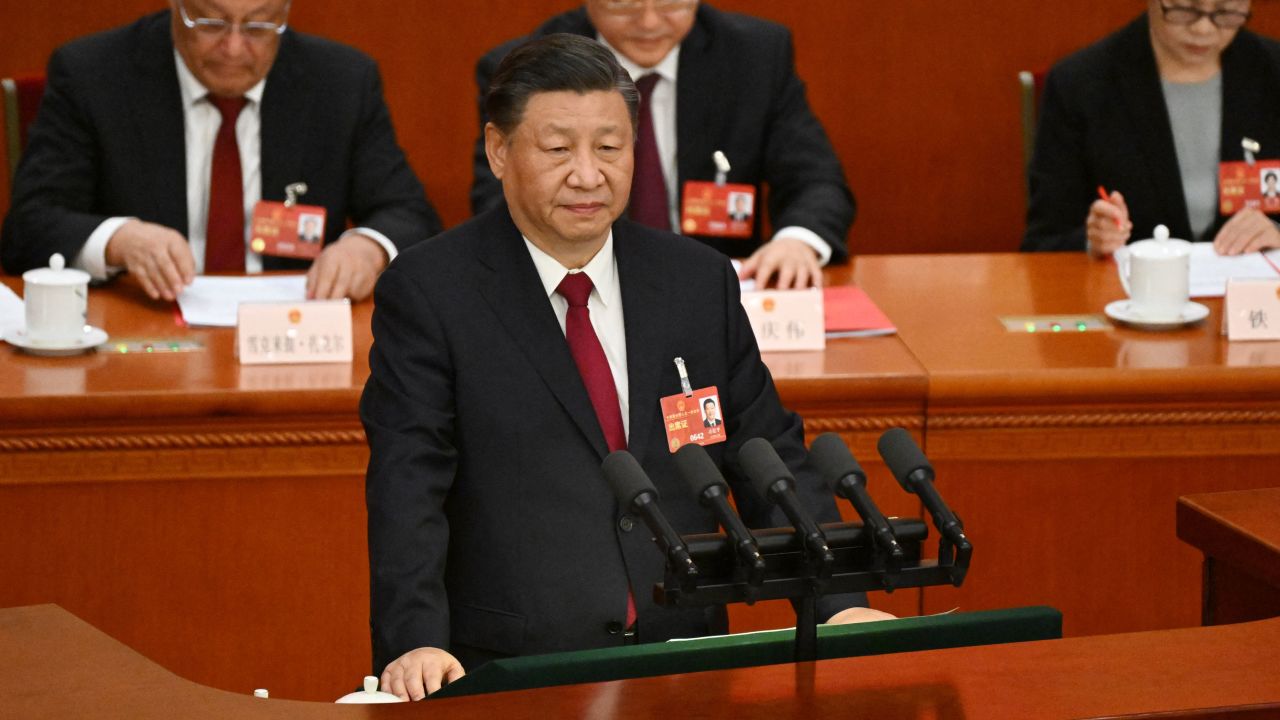(CNN) – Chinese President Xi Jinping on Monday vowed to boost national security and turn the military into a “great steel wall” in his first speech of his third term as president.
At the conclusion of the annual meeting of the Chinese parliament, Xi stressed the need for comprehensive modernization of national defense and the army.
“We must turn the People’s Liberation Army into a great iron wall that effectively protects national sovereignty, security and development interests,” Xi told some 3,000 delegates from the National People’s Congress.
Shi, 69, Unanimously approved by APN He will serve as China’s president for another five years in a ceremonial formal vote on Friday, making him the longest-serving head of state of communist China since its founding in 1949.
Chinese leader Xi Jinping delivers the first speech of his third term as president, at the closing ceremony of the National People’s Congress in Beijing on March 13.
At the beginning of his speech on Monday, Xi thanked the delegates for his re-election.
“This is the third time that I hold the high position of president. The trust of the people is the greatest force that drives me forward and it is also a great responsibility on my shoulders,” he said.
As in many of his previous speeches, Xi took on a nationalist tone, citing the hardships China suffered at the hands of “bullying foreign powers” in modern times, and noting how the Communist Party had led the country to “erasing national humiliation.”
“The Chinese people have become masters of their own destiny,” he said. “The great rejuvenation of the Chinese nation has entered an irreversible historical process.”
According to Xi, the “core” of this renewal is “national unification”, that is, the “reunification” of Taiwan with mainland China.
The Chinese Communist Party claims independent democracy in Taiwan is part of its territory, though it never controlled it, and refuses to rule out the use of force.
Under Xi, Beijing has intensified its economic, diplomatic and military pressure on Taiwan. Russia’s invasion of Ukraine, which Beijing did not condemn, has raised fears that Xi will attempt something similar in the coming years.
“We should… actively promote the peaceful development of relations across the Taiwan Strait, resolutely oppose interference by outside forces and separatist activities in Taiwan, and vigorously push forward the process of national reunification,” Xi told news outlets. Great Hall of the People.
Xi also urged China to better coordinate development and security.
“Security is the basis for development, and stability is a prerequisite for prosperity,” he said.
During the first decade of his rule, Xi overhauled the Chinese military to transform it into a modern fighting force, and made its navy the largest in the world.
China’s annual military budget It will increase 7.2% this yearamounting to about 1.55 trillion yuan ($224 billion), amid rising geopolitical tensions and ethnic regional weapons And also universal.
He also consolidated his control over the military and civilian arms of government to become China’s most assertive and dominant leader in a generation.
The focus on bolstering security and the military comes as China’s relations with the United States are at their lowest point in decades, with tensions rising in sectors ranging from trade and technology to geopolitics, especially over the future of Taiwan.
Last week, in unusually frank remarks, Xi accused the United States of leading Western countries to “contain and suppress” China and pose “unprecedentedly serious challenges.”
Xi’s new foreign minister, Chen Gang, warned that if the United States did not “put on the brakes,” the two superpowers would undoubtedly descend into “conflict and confrontation.”

“Music buff. Social media lover. Web specialist. Analyst. Organizer. Travel trailblazer.”

:quality(85)/cloudfront-us-east-1.images.arcpublishing.com/infobae/TEQF6EONZRFGLLLDIDD4L2O4EE.jpg)

:quality(75)/cloudfront-us-east-1.images.arcpublishing.com/elcomercio/XU32LRAEZFDDPNVHLFU3CKVBYY.jpg)



More Stories
Sheinbaum, Galvez, Mainz campaign wrap-up, news and more
Sheinbaum and Mainz’s CDMX campaign wraps up: Road Alternatives and Street Closures
Ortega attacks Humberto Ortega and declares him a “traitor to the country”